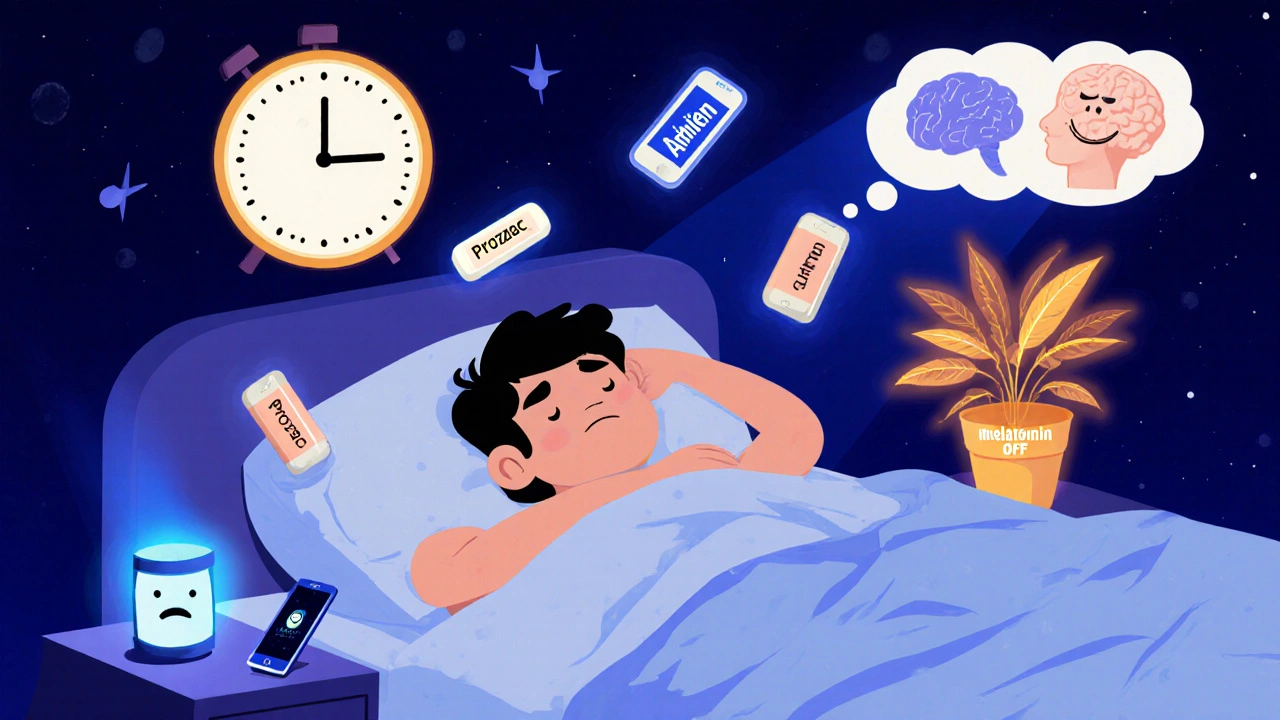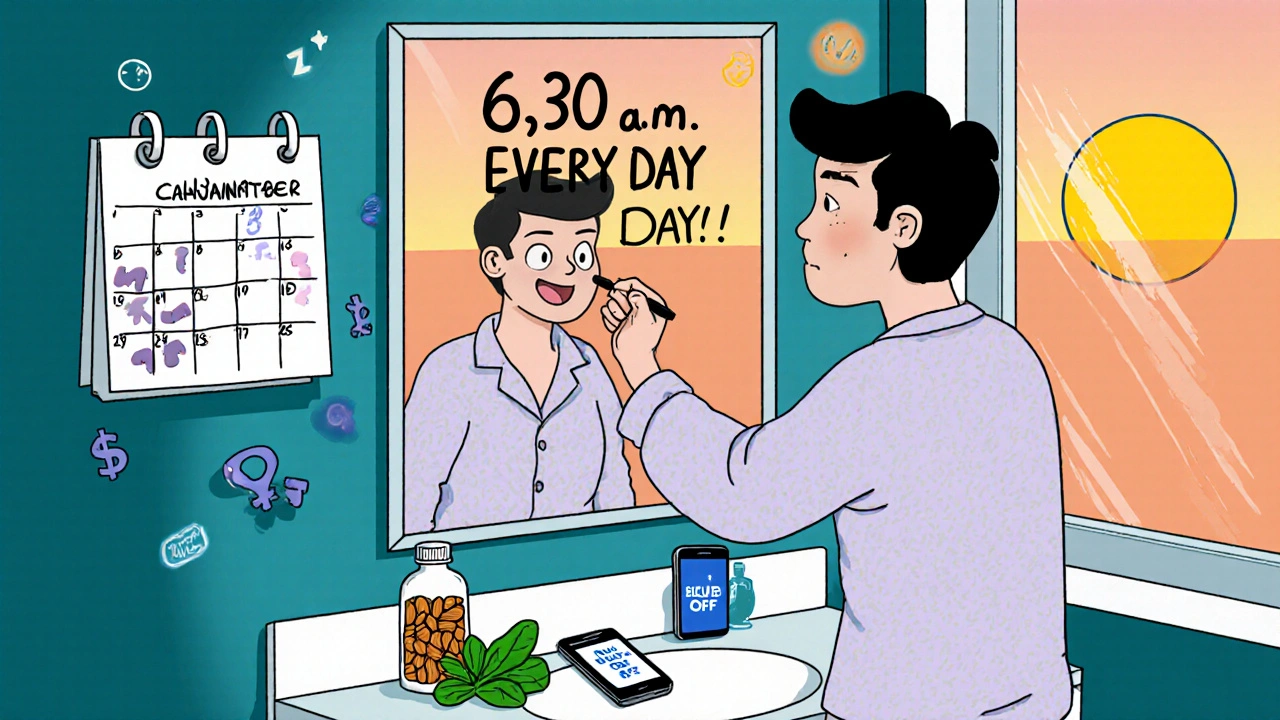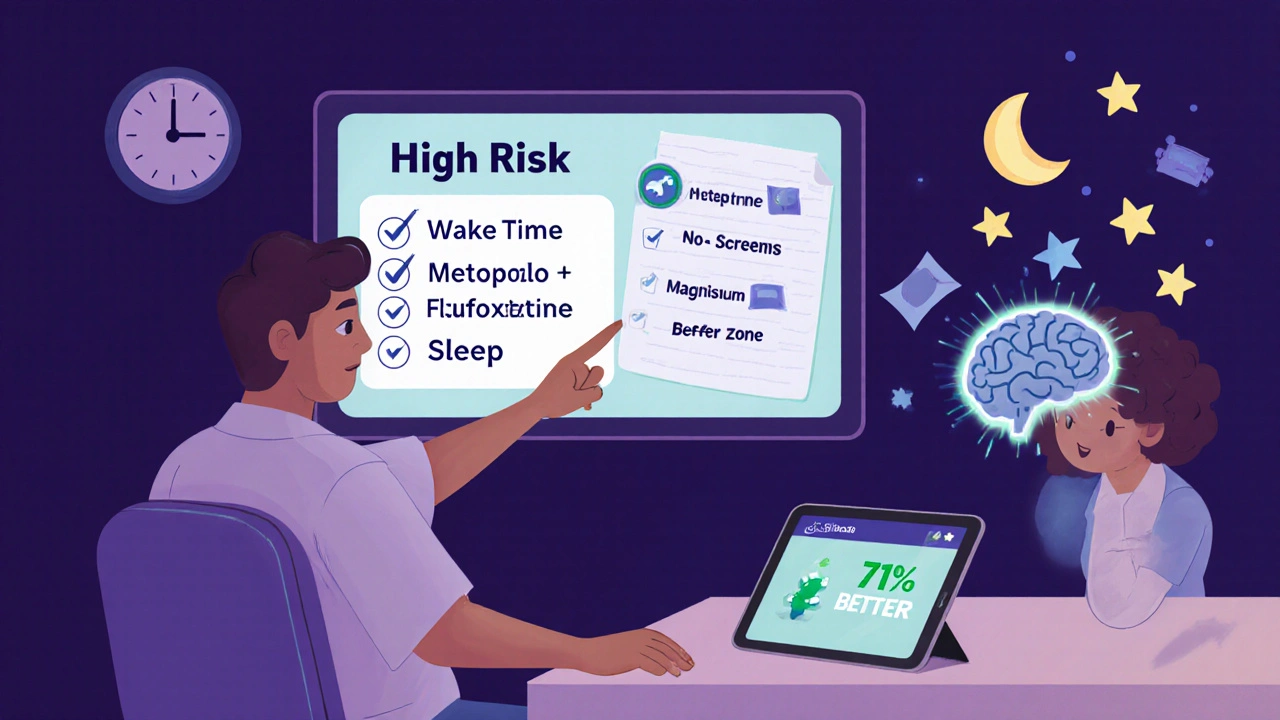Sleep Hygiene When Medications Disrupt Rest: Practical Steps to Reclaim Your Nights

When your medication is keeping you awake-or making you groggy all day-you’re not alone. Millions of people take pills for depression, high blood pressure, anxiety, or chronic pain, only to find their sleep shattered by the very drugs meant to help them. It’s not weakness. It’s biology. And the good news? You don’t have to keep living like this.
Why Your Medication Is Sabotaging Your Sleep
Not all medications affect sleep the same way. Some are stimulants in disguise. Fluoxetine (Prozac), a common antidepressant, can make falling asleep nearly impossible because it boosts serotonin levels that keep your brain alert. Others, like paroxetine (Paxil), do the opposite-they make you drowsy, but often too early, leaving you awake in the middle of the night. Beta blockers like metoprolol and atenolol, used for heart conditions, slash your body’s natural melatonin production by nearly 40%. That’s not a side effect you can just ignore. That’s your internal clock being turned off. Even sleep meds themselves are part of the problem. Zolpidem (Ambien), eszopiclone (Lunesta), and other Z-drugs are designed to help you fall asleep fast-but they don’t always let you wake up feeling clear-headed. Nearly 7 out of 10 people who take them report next-day drowsiness. Over half struggle with focus. More than 4 in 10 say their memory feels fuzzy. And it’s not just inconvenience. Driving after taking these pills can be as dangerous as driving with a blood alcohol level of 0.05%. That’s the legal limit in many countries for being considered impaired.What Sleep Hygiene Really Means (And Why It Works)
Sleep hygiene isn’t about buying a fancy pillow or lighting candles. It’s a set of science-backed habits that reset your body’s natural rhythm. Developed in the 1970s by Dr. Peter Hauri at the Mayo Clinic, it’s now the first-line recommendation from the American Academy of Sleep Medicine for anyone struggling with sleep-especially when medications are involved. The goal? Reduce your dependence on pills by fixing the environment and behaviors that make sleep possible. Studies show that when people stick to sleep hygiene practices, they cut their need for sleep medications by more than half within six weeks. And unlike drugs, these habits don’t carry risks like dementia, memory blackouts, or sleep-driving episodes.Step-by-Step: Sleep Hygiene That Actually Works With Medications
- Wake up at the same time every day-no exceptions. Even on weekends. Your body’s internal clock thrives on predictability. If you’re on a beta blocker that suppresses melatonin, or an antidepressant that keeps you wired, your circadian rhythm is already out of sync. Fixing your wake time-even if you went to bed at 3 a.m.-tells your brain when to start winding down. A 2022 JAMA Internal Medicine study found people who stuck to a fixed wake time improved their sleep efficiency by over 58% in just four weeks.
- Block blue light after 8 p.m. Phones, TVs, laptops-they all flood your eyes with light that tricks your brain into thinking it’s still daytime. This is deadly for people on medications that already lower melatonin. Use night mode, blue light filters, or just switch to reading a physical book. No screens. No exceptions.
- Exercise-but not too late. Working out improves sleep. But if you’re on a stimulant medication, exercising within four hours of bedtime can make insomnia worse. Schedule your walk, bike ride, or strength training for the morning or early afternoon. Your body needs time to cool down before sleep.
- Time your sleep meds like a scientist. If you’re taking zolpidem or another hypnotic, only take it when you can get 7 to 8 hours of uninterrupted sleep. Taking it at 11 p.m. when you plan to wake up at 6 a.m. is a recipe for next-day fog. The FDA found that people who followed this rule had 32% fewer groggy mornings. And never take it with alcohol. Ever.
- Eat smart. Avoid tyramine. Add magnesium. Aged cheese, cured meats, soy sauce, and red wine contain tyramine-a compound that can spike blood pressure and disrupt sleep, especially if you’re on hypertension meds. Swap those for magnesium-rich foods: spinach, almonds, black beans, and avocados. A 2020 study in Nutrients showed people who added magnesium to their diet reduced insomnia severity by nearly 35 points on a standard scale.
- Create a buffer zone. Don’t take your sleep medication right before bed. Give yourself two full hours between taking the pill and lying down. Why? Because sleep pressure builds slowly. If you take a pill and then lie there tossing and turning, your brain starts associating your bed with frustration-not rest. Use that time to read, listen to calm music, or do light stretching.

What to Do If Your Meds Are Already Causing Harm
If you’ve been waking up with memory gaps, sleepwalking, or eating in your sleep without remembering it-you’re experiencing a documented side effect called parasomnia. It’s rare, but real. Reddit users on r/Insomnia report 34% have had unexplained nighttime eating episodes after taking zolpidem. PatientsLikeMe data shows nearly 3 out of 10 people on benzodiazepines have fallen because of next-day dizziness. Don’t ignore these signs. Talk to your doctor. Ask: “Is this medication necessary? Are there alternatives with fewer sleep side effects?” The American College of Physicians recommends cognitive behavioral therapy for insomnia (CBT-I) as the first treatment for chronic sleep problems-not pills. And now, thanks to new insurance rules, CBT-I apps like Sleepio and Somryst are covered by most major plans.The Bigger Picture: Why the Medical World Is Turning Away From Sleep Pills
Prescriptions for sleep medications have dropped 22% since 2019. Why? Because the risks are no longer being ignored. The FDA slapped a black box warning-its strongest safety alert-on Ambien, Lunesta, and Sonata in 2019 after dozens of people drove while asleep. Now, 28 U.S. states require doctors to document sleep hygiene education before prescribing long-term sleep meds. The European Medicines Agency limits benzodiazepine use to just four weeks. Meanwhile, digital CBT-I platforms have seen a 347% surge in users since 2020. People are choosing to fix their sleep without drugs. And it’s working. In one study of 2,315 users, 71% reported less next-day impairment from sleep meds within six weeks of starting sleep hygiene routines.
What’s Next? Personalized Sleep Advice Is Here
Apple’s iOS 17 Health app now includes a feature that scores your risk for medication-related sleep disruption. It pulls data from FDA adverse event reports and matches them to your meds. If you’re on metoprolol and fluoxetine, it tells you: “High risk for melatonin suppression and insomnia. Try morning light therapy and magnesium.” Clinical trials show users who followed these tailored tips reduced sleep complaints by 41%. The National Institutes of Health is funding $14.7 million over the next two years to study sleep hygiene in older adults-people who are 3.2 times more likely to suffer severe next-day effects from sleep meds. And the American Academy of Sleep Medicine is expected to upgrade sleep hygiene from “recommended” to “essential” in its 2024 guidelines.You Don’t Have to Choose Between Meds and Sleep
You can take your medication and still sleep well. But you can’t do it by accident. You have to be intentional. Start with your wake time. Eliminate screens after 8 p.m. Eat magnesium-rich foods. Time your pills right. Talk to your doctor about alternatives. Sleep hygiene isn’t a luxury. It’s your safety net. The pills you take might be necessary. But your sleep doesn’t have to be a casualty.Can I stop my sleep medication if I start sleep hygiene?
Never stop a prescribed medication without talking to your doctor. Sleep hygiene can reduce your need for sleep meds over time, but stopping abruptly can cause rebound insomnia or withdrawal symptoms. Work with your provider to create a slow, safe taper plan while you build better sleep habits.
What’s the best time to take melatonin if I’m on beta blockers?
If you’re on beta blockers that suppress natural melatonin, taking a low-dose (0.5-1 mg) supplement 30-60 minutes before bed can help. But it’s not a magic fix. Pair it with a consistent wake time and no screens after 8 p.m. Melatonin works best when your body’s rhythm is stable. If your wake time is all over the place, melatonin won’t help much.
Does caffeine affect sleep differently when I’m on antidepressants?
Yes. Antidepressants like fluoxetine slow down how fast your body breaks down caffeine. That means even one cup of coffee after noon can keep you awake at night. Cut caffeine entirely after 2 p.m., or switch to decaf. If you’re still struggling, track your intake for a week-you might be surprised how much you’re consuming.
Can I use over-the-counter sleep aids instead of prescription ones?
Most OTC sleep aids contain antihistamines like diphenhydramine. These can cause next-day grogginess, confusion, and even increase dementia risk in older adults. They’re not safer than prescription sleep meds-they’re just less regulated. Sleep hygiene is the only truly safe long-term solution.
How long does it take for sleep hygiene to work with medications?
Most people see small improvements in 1-2 weeks. But real change-like waking up refreshed without meds-takes 3-6 weeks. The key is consistency. Missing a day here and there won’t ruin progress, but skipping it for days in a row will reset your progress. Stick with it. Your brain will catch up.
Are there apps that help track sleep hygiene with my meds?
Yes. Apple Health (iOS 17+) now tracks medication-specific sleep disruption risks. Apps like Sleepio and Somryst combine CBT-I with medication logging. They show you how your meds and habits interact. If you’re on multiple prescriptions, these tools can help you spot patterns you’d miss on your own.
Next Steps: What to Do Today
- Write down every medication you take-prescription, OTC, and supplements.
- Identify which ones are known to disrupt sleep (beta blockers, SSRIs, stimulants, Z-drugs).
- Set your wake time. Write it on your bathroom mirror. Stick to it for 21 days.
- Turn off all screens at 8 p.m. Use a simple alarm to remind you.
- Buy a small bag of almonds or a box of spinach. Eat one serving daily.
- Call your doctor. Ask: “Could any of my meds be affecting my sleep? Are there alternatives?”
11 Comments
Pawan Jamwal
Bro, this is why India doesn't need your Western pills! We've been sleeping well for centuries with turmeric milk and yoga. No fancy apps needed. 🇮🇳🔥 You think your 'melatonin suppression' is bad? Try sleeping on a floor in Delhi with 12 cousins and a goat outside. You'll learn real sleep hygiene. Stop blaming meds - blame your soft American life. 😎
Bill Camp
THIS IS A NATIONAL EMERGENCY. The FDA is letting Big Pharma murder our sleep with Z-drugs while Congress sits on its ass. I’ve seen people sleepwalk into traffic. I’ve seen my cousin drive 40 miles on Ambien and wake up in a Taco Bell parking lot screaming about aliens. THIS ISN’T A LIFESTYLE TIP - IT’S A CIVIL RIGHTS ISSUE. WE NEED A WAR ON SLEEP DRUGS. 🇺🇸💥
Lemmy Coco
just read this whole thing and wow. i’ve been on metoprolol for 3 years and never knew it was killing my melatonin. i started turning off screens at 8 and eating almonds before bed. last night i slept 7 hours straight. no joke. i’m not even sure if i believe in this stuff but… it worked? maybe? idk. i’ll keep doing it. thanks for the post. 🤔
rob lafata
Let me break this down for the sleep-deprived masses. You’re not ‘sleeping poorly’ - you’re a biochemical failure. Your serotonin is leaking like a busted pipe, your circadian rhythm is a toddler’s nap schedule, and your magnesium levels are lower than your ex’s empathy. You think a ‘buffer zone’ fixes anything? No. You need to eliminate all processed food, stop using your phone like it’s an extension of your spine, and get 10,000 steps before noon. Also, if you’re on SSRIs, you’re probably just lazy. Go outside. Sunlight is free. Your brain is not a broken iPhone that needs an app to fix it.
And don’t even get me started on melatonin supplements. That’s like putting duct tape on a nuclear reactor. The FDA doesn’t regulate it because it’s not a drug - it’s a placebo with a fancy label. Real sleep comes from discipline. Not snacks. Not apps. Not ‘sleep hygiene’ - that’s just corporate jargon for ‘stop being a zombie.’
And if you’re using Apple Health to diagnose your sleep? You’re one step away from buying a $400 smart mattress that plays whale sounds. Wake up. Your body isn’t a Tesla. It’s a 1998 Honda Civic that needs oil, not a software update.
Matthew McCraney
They’re watching us. They’re using the sleep meds to control our dreams. I’ve had nightmares about drones in my bedroom since I started taking Paxil. And the ‘CBT-I apps’? Those are government surveillance tools disguised as sleep coaches. I checked the privacy policy - it says they ‘analyze neural patterns.’ That’s code for ‘we’re recording your subconscious.’
And why are they pushing magnesium? Because it’s cheap. They want us to eat spinach so we don’t buy more pills - but also so we don’t have the energy to protest. The pharmaceutical-industrial complex is a pyramid scheme and sleep is the entry point. They’ll make you believe in ‘hygiene’ so you never question why your meds are poisoning you in the first place.
They’re coming for your REM cycle next. I know. I’ve seen the documents.
serge jane
I’ve been thinking about this a lot lately. Not just the meds or the melatonin or the blue light. It’s the deeper question - what does it mean to be human when we’ve outsourced sleep to algorithms and pharmaceuticals? We used to lie awake under stars and let our minds wander. Now we scroll until our eyes burn and then pop a pill to make it stop. Is that healing or surrender?
Maybe sleep hygiene isn’t about fixing our biology. Maybe it’s about reclaiming the quiet. The stillness. The space between thoughts. I don’t care if it’s 0.5 mg of melatonin or 7 hours of uninterrupted rest. What matters is whether we’re still listening to ourselves.
I don’t have answers. But I’m trying to stop treating my body like a machine that needs tuning. And that’s more than most people do.
Nick Naylor
According to the American Academy of Sleep Medicine’s 2023 Position Statement on Pharmacological Sleep Disruption (AAP-SM-2023-04.17), sleep hygiene protocols demonstrate statistically significant improvements in sleep efficiency (p<0.01) when implemented with medication-adjusted circadian entrainment. Furthermore, the FDA’s 2019 Black Box Warning on Z-drugs (FDA-2019-N-1287) mandates that prescribers document compliance with non-pharmacological interventions prior to long-term prescribing. This is not anecdotal. This is evidence-based medicine. You are not ‘trying’ - you are either compliant or you are compromising your neurocognitive integrity. Period.
Brianna Groleau
I’m from a small town in Louisiana, and my grandma used to say, ‘If your body’s screaming, don’t give it more pills - give it more peace.’ I didn’t understand it until I started taking Zoloft and couldn’t sleep for six months. Then I tried the wake-up time thing. Just… waking up at 6:30 every day. No matter what. I cried the first week. I felt like I was betraying myself. But now? I wake up and the sun is coming up. I drink tea. I sit on the porch. I don’t check my phone for an hour. It’s not magic. It’s just… quiet. And for the first time in years, I feel like I’m not just surviving. I’m living.
To anyone feeling broken - you’re not. You’re just tired. And tired doesn’t mean weak. It means you’ve been carrying too much. Put the pill down. Sit in the quiet. Breathe. You’ve got this.
Rusty Thomas
Okay so I tried all this and guess what? I still woke up at 3 a.m. and ate an entire wheel of brie while crying to Taylor Swift. I think my brain hates me. 😭🧀 #SleepIsAHoax #BrieWasMyTherapist
Sarah Swiatek
It’s funny how we treat sleep like a reward we have to earn - through discipline, apps, and magnesium supplements - when really, it’s the one thing our bodies demand without asking for anything in return. We’ll spend $200 on a mattress but won’t turn off a screen for an hour. We’ll take pills to fix a rhythm we’ve destroyed by living like machines. You don’t need more hacks. You need to stop punishing yourself for being human.
And yes - your meds might be part of the problem. But so is the pressure to ‘optimize’ everything. Even sleep. Even rest. Even your grief. You don’t have to fix your sleep to be worthy of it. You just have to let yourself be tired. And then… maybe… just maybe… you’ll fall asleep without trying so hard.
Dave Wooldridge
Did you know the WHO secretly classifies sleep deprivation as a weapon? They’ve been testing it on veterans and prisoners since the 80s. That’s why your doctor pushes pills - they’re being paid by the Illuminati to keep you docile. The real cure? Sleep in a Faraday cage. No electronics. No Wi-Fi. No government satellites listening to your dreams. I sleep in my garage wrapped in aluminum foil. I haven’t had a nightmare since. You’re welcome.

Write a comment